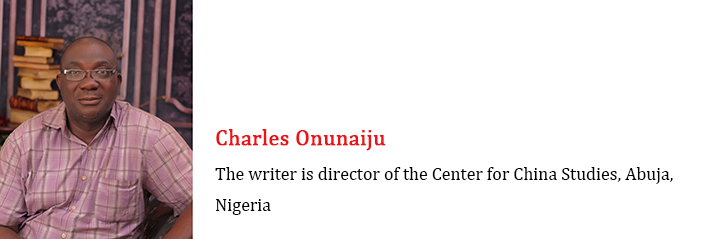|
||||||||||
| Home Nation World Business Opinion Lifestyle ChinAfrica Multimedia Columnists Documents Special Reports |
|
||||||||||
| Home Nation World Business Opinion Lifestyle ChinAfrica Multimedia Columnists Documents Special Reports |
| ChinAfrica |
| Understanding Realities |
| Africa needs to follow its own path of reform to realize its potential |
| By Charles Onunaiju | VOL.10 December ·2018-12-04 |

More and more African people come to Guangzhou to do business in recent years (DENG HUA)
It has been 40 years since China embarked on "crossing the river by feeling the stones," navigating through the untrodden path and uncharted waters to drive its iconic modernization effort through reform and opening up.
In the keynote speech to the first China International Import Expo (CIIE) held in Shanghai in early November, Chinese President Xi Jinping described the last four decades of reform and opening up in China as an "epic journey for the Chinese people," and added that "China has pursued development with its door open and succeeded in transforming a closed and semi-closed economy into a fully open economy."
China's epic revolutionary struggle leading to national liberation and socialist construction is momentous in the annals of human history, and nothing prepared the world for the historic Third Plenary Session of the 11th Central Committee of the Communist Party of China (CPC) in December 1978, where the decision to take economic modernization as the core of its work was made, heralding reform and opening up as the major trajectory for its future governance of China.
Keep moving forward
Even though reform and opening up, according to Xi, "is a strategic decision made by China based on its need for development as well as a concrete action taken by China to move economic globalization forward in ways that benefits people across the world," the lessons and experiences in staying the course of reform and opening up constitute critical and strategic resource materials which can help Africa's development.
Forty years into what some people called China's second revolution, it is not only the country that has changed, but even humanity faces a bright and new prospect of opportunities that can address its core concerns - ranging from existential material needs to peace and security. The Chinese experience teaches that there is no ready-made model, but the way forward is through ceaseless and confident experimentation to either reduce or increase the pace, but never standing still or turning back.
Forty years of relentless drive of China's modernization through reform and opening up have also proved that difficult but independent choices made from understanding one's real national condition, engaging it realistically and constant evaluations of contradictions, with its inbuilt mechanisms for fact checks, can guarantee the steady flow of capabilities and capacities to drive sustainable and inclusive development.
Reform and opening up has brought China unprecedented prosperity, in not only raising the quality of life for its people, but also increasing the tempo of continuing to seek better life for them. It has, however, also brought the country face to face with the responsibility to help drain the swamps of global poverty, sieve the endemic network of insecurity and help ensure that the dividends of prosperity and peace, created by the advancement of knowledge, science and technology are more evenly spread across all humanity.
Reform and opening up has given China a sophisticated tool of global engagement beyond its neighborhood and there is no other region in the world where the intensity and depth of China's profuse and comprehensive cooperation is more evident than in Africa.
Lessons for Africa
Africa's development trajectories have suffered challenges not for want of courage or persistence, but in the deficit of grasping the existential realities and specific conditions of each African country and the contradictions it generates. China's basic outline in reform and opening up has consisted essentially in understanding the severity of its existential realities and national condition at any particular time and the huge exertions and toils that must be deployed to engage it. And that this trajectory of ceaseless engagement does not brook complacency, laxity or even a momentary relaxation.
Noting that China's path to development is, of course, unrepeatable by any other nation, the main lesson, which is "about using economics and governance to improve society" will ultimately resonate and make impressions in Africa.
Forty years ago, not many people in Africa could tell where Guangzhou was. Today it is a famous commercial and capital city of China's coastal Guangdong Province, a business hub where most Nigerians and their African peers gather for lucrative business opportunities. Actually, 40 years ago, Aba and Kaduna cities in Nigeria, just to mention a few such examples in Africa, were the hub of leather and textile business in West Africa and were on their way to integrating into the all-important global industrial value chain that gives a country a significant niche in global business. But not any more. Guangzhou has prospered and soared to an international commercial hub, while Kaduna and Aba are currently littered with rusting and long abandoned industrial machines. But these two cities can surely rise again.
The founding of the People's Republic of China in 1949 gave the Chinese people an exclusive prerogative for the first time in their long history to decide their destiny. They did; but 1978 was the moment of significant national introspection, difficult choices and bold decisions.
The leadership of the CPC made the decision to move away from the comfort zone of easy revolutionary rhetoric, took economic modernization as a central task, launched reform and opening up and traveled the difficult terrain of "crossing the river by feeling the stones."
Will Africa and its various countries make the difficult choice of moving away from the comfort zone of endlessly reclining in received wisdom, foreign political systems and orthodox economic models that have got it nowhere? Africa must begin the hard task of relentlessly interrogating its own realities and forging its institutional and policy frameworks, and enjoy the valid lessons of China's initiated maxim that "practice is the sole criterion for truth."
Aba, Kaduna and numerous other cities that are potential industrial outposts in Africa will rise again if Africa seeks a renaissance and reforms that are rooted in its own realities. When these reforms are added to an unprecedented international partnership of a massively regenerated China, willing and able to productively and respectfully engage Africa, the continent's famed potentials will definitely be on the cusp of actual realization.

(Comments to niyanshuo@chinafrica.cn)
| About Us | Contact Us | Advertise with Us | Subscribe |
| Copyright Beijing Review All rights reserved 京ICP备08005356号-5 京公网安备110102005860号 |